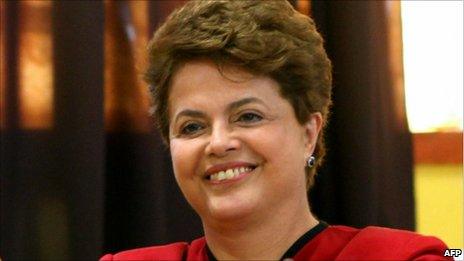Has Brazil voted for continuity?
- Published

The election of Dilma Rousseff can largely be attributed to the broad popularity of President Lula
As the polls predicted, the second round of Brazil's elections has resulted in the election of the country's first woman president, Dilma Rousseff of the Workers Party (PT).
On 1 January 2011, President Rousseff will take the reins of the federal government, and the political base of her government will be a 10-party alliance constructed by her predecessor, outgoing President Luiz Inacio Lula da Silva.
The election of Dilma Rousseff can largely be attributed to the broad popularity of President Lula and his policies of economic redistribution and social inclusion.
Ms Rousseff's highest level of support came from the majority of the population in households earning just under the equivalent of $800 (£500) a month.
The majority of the affluent - those in households earning more than $3,200 (£2,000) a month - supported opposition candidate Jose Serra of the Social Democratic Party (PSDB).
President Lula's policies of raising the minimum wage, expanding conditional cash transfers to the poor under the family allowance programme Bolsa Familia, and stimulating the creation of formal-sector jobs in an economy currently growing at about 7% per year ensured the popularity of his chosen successor - an administrator with no previous experience of elected office.
Brazil's more than 135 million voters appear to have opted for continuity, but politics can be surprising.
Reinvention
Interesting questions can be asked about what this election means for Brazil's major political parties, the government's economic policy and its external relations.
For the past 16 years, Brazilian politics have been polarised between coalitions headed by the PSDB and PT respectively.
Both parties will try to reinvent themselves after this election.
The PSDB must wonder whether it is capable of recapturing the support of those voters from lower-earning families.
Before 2006, these voters were quite likely to vote for a candidate of the right or centre-right, but for the past two elections these voters have overwhelmingly supported the PT's candidates, Mr Lula and Ms Rousseff.
If the PSDB can unite around a popular candidate such as Senator Aecio Neves from the state of Minas Gerais, it could reverse this tendency in the 2014 presidential elections.
For the PT, it is unclear whether the party is really entering a post-Lula phase.
Ms Rousseff owes her presidency to Mr Lula, who might decide to use his immense popularity and play an active role as an informal adviser to her government.
Many observers believe that Mr Lula could be tempted to run in 2014 if Ms Rousseff's candidacy looks weak.
For both parties the question is whether their long dominance of electoral politics could come to an end.
The surprising showing of Marina Silva of the Green Party in the first round, in which she garnered almost 20% of the valid votes, suggests this possibility.
The strong showing in these elections of the Socialist Party (PSB), currently an ally of the PT, is another sign of the potential erosion of Brazil's bipolar party system.
Lower profile
With regard to the economy, it is unclear whether Brazil can reduce its dependence on commodity exports and increase its production of higher value-added manufactured goods and services.
To achieve this, the quality of public education, especially at the secondary level, would have to improve, the real would have to drop in value, and the government's plans to upgrade the country's infrastructure - especially ports, roads, railways, and airports - would have to be successfully implemented.

Lula might be tempted to run for president in 2014
Brazil's industrial policy of supporting business through low-cost loans from the National Bank for Development (BNDES) would also have to bear fruit.
Since the rise of China as a manufacturing giant and the massive state interventions that took place around the world in 2008, the world has become increasingly mercantilist.
The question is whether Brazil can sustain economic development that benefits the poorest half of the population in such an environment.
In foreign policy, Dilma Rousseff's government will probably be more cautious and have a lower profile than Mr Lula's.
But Brazil's involvement in international negotiations about climate change mitigation, trade, biodiversity, governance, peace and security, and finance will remain important.
Brazil, a mid-level global power in an increasingly multi-polar world, will occasionally differ with other powers, including the United States.
This is natural, and not new.
The government of Gen Ernesto Geisel (1974-1979) defied the US by recognising the Soviet-backed MPLA government in Angola and acquiring nuclear technology from West Germany in the 1970s.
The government of Jose Sarney (1985-1990) engaged in arms sales to Saddam Hussein's Iraq in the late 1980s.
Mid-level powers have permanent interests, not permanent friends, and observers of Brazilian foreign policy should accept a degree of independence from the policies of long-established powers as a price for the country's new status in the community of nations.